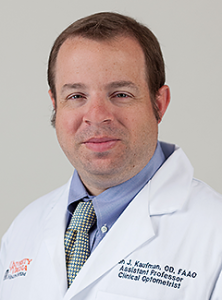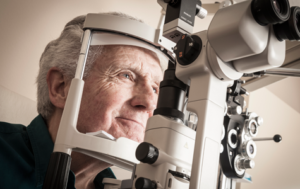
Evan Kaufman, OD, has been a practicing optometrist for eight years. He joined UVA’s Department of Ophthalmology in August of 2014. We caught up with him to learn more about his passion for eye care, as well as some common eye health questions.
What did you want to be when you were little?
I always wanted to work in the medical field. I grew up in a house with doctors who had a positive influence on my life. In high school and college I shadowed many sub-specialties but found that my passion is caring for eyes.
What drew you in to the field of optometry?
Optometrists deal with vision and how humans see. Our branch of science understands light and optics. Vision is fascinating, especially when you think of your brain like a giant computer. What it interprets is a neurological signal from the eye.
We have many colors in our world — how does the eye differentiate shades of color? We have depth perception — how does the eye know what is close and what is far? We have motion in our life and the eye never misses a beat. The human eye and pathway is captivating. That’s why I entered the field of optometry.
What’s your role at UVA?
I would categorize myself as a primary eye care provider, so I know a little bit about a lot of different things in the eye. I deal with everything from diabetic eye exams to conjunctivitis and pinkeye. At the Eye Clinic, my role is to help direct patients to the appropriate specialist if needed, all while providing the patient a high-level of routine eye care.
My specialty in the department would be contact lenses. I have been trained to fit hard contact lenses, bifocal contact lenses, contact lenses for astigmatism and contact lenses for ocular disease.
I see a wide variety of patients ranging from children to adults and geriatrics. My age range for scope of practice is mainly ten years of age and up, but I will see younger children upon request.
Why should people seek eye care at UVA?
We can provide full-service eye care. If a patient receives routine eye care with us and happens to develop ocular disease, we have a wide range of in-house specialists who can provide optimal care.
We have specialists in:
- Glaucoma
- Cornea care
- Neuro ophthalmology
- Retina care
- Pediatrics strabismus
- General eye care
A patient can get an eye exam for glasses or contacts from one provider while being treated for glaucoma by another, all within the same system.
Preventive eye care is just as important as treating patients with advanced disease. Routine eye exams can spot early signs of some vision-threatening conditions and implement early treatment to prevent loss of vision.
Our department is also actively involved in many sponsored clinical trials to test new ophthalmic procedures and treatments. Many faculty members conduct their own research to investigate new treatment options.
Common eye health questions you receive?
There are three common questions I get asked,
- Do I have cataracts? Everyone develops cataracts if they live long enough. Some people develop them at 60 years old and some at 90; there are multiple factors involved.
- Do I have macular degeneration? Macular degeneration is a hereditary disease and one of the leading causes of blindness in the United States. There’s no cure, but there are multiple treatment options.
- Am I a candidate for LASIK surgery? I’m very happy to say that UVA now has a corneal specialist, Jeffrey Golen, MD, who performs LASIK surgery. We have to consider a potential candidate’s age, prescription and ocular health status. So when I’m asked, “Can I get LASIK surgery?” most of the time the answer is, “Yes, but it might not be the best option for you.”
Best Advice For Maintaining Eye Health?
- Everyone should get annual dilated eye exams. They provide the optimal views for an eye care provider to properly advise the patient. Exams without dilation limit the doctor’s ability to properly evaluate the eye and provide suitable treatment.
- People should not sleep in their contact lenses. This can lead to an increased chance of infection and corneal edema; problems that can significantly affect a patient’s vision.
To make an appointment with Dr. Kaufman or to learn more about eye health, make an appointment with the Eye Clinic.
I am 66 years old and in good health. In 1980 at the age of 29, I had lazy eye surgery. After the surgery I have had to wear glasses with prisms. For several years I have experienced some dizziness and also a vision that seems slightly out of focus [for lack of a better way to describe it]. I’m looking for an eye doctor that is well versed or specialized in prisms. If you can recommend someone I would really appreciate it With regards.
I want to suggest having multicultural eye specialists. I came to this center 2 times. It took a long time for them to check my eyes. I sat for 1 hour extra even though i had arrived at my appointment 10min prior to the time. Maybe they have a problem with multicultural patients because i noticed that other patients were being treated before me. Maybe they should audit the employees and how they respond to a multicultural patient as part of checking up on the employee habits.
We are so sorry to hear that. We’d like to talk with you more about your experience and look into this. If you are comfortable with that, please contact our patient representatives at 434.924.8315 or patientrelations@virginia.edu.